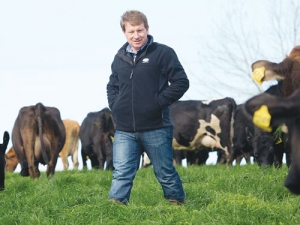Fonterra opens organic milk supply to South Island dairy farmers
South Island dairy farmers will soon be able to supply organic milk to Fonterra.
 Fonterra chairman John Wilson predicts market access for dairy products will be up for renegotiation.
Fonterra chairman John Wilson predicts market access for dairy products will be up for renegotiation.
The US dairy interests will realise within five to 10 years they got it wrong by opposing dairy tariff removal in the Trans Pacific Partnership (TPP) negotiations, says Fonterra chairman John Wilson.
Market access for dairy products will go back to the negotiating table for TPP countries within five to 10 years, Wilson predicts. Dairy negotiators in TPP understood the benefits "but were not brave enough to show the leadership to transition their sectors into total trade elimination," Wilson says.
Other countries will want to join the TPP and Wilson predicts within five to 10 years dairy tariff elimination will be looked at again.
"The problem is we have very strong protectionist lobby groups focused on how dairy, for example in the US, has operated over the last decade rather than what the potential is for the future," Wilson says.
"The dairy industry in the US will look on this in five or 10 years and recognise the TPP got this wrong -- that they should have been driving far harder for total tariff elimination alongside New Zealand and Australia. They are already the biggest exporter within the TPP region; they export more than we do in dairy within the TPP region.
"They already export 15% of their production; that is already about three quarters of NZ's production, so they are already a significant exporter globally as well.
"So, a huge opportunity for their exporters; but their exporters tend to be more on the West Coast and the protectionist group is more in the Midwest or towards the north-east and, given how difficult this whole negotiation became politically -- not just in dairy but in autos, biologics, tobacco, sugar and rice -- that ambition of tariff elimination unfortunately hasn't won the day."
Regardless, it is important that TPP has been concluded and must now be enacted, says Wilson. "I have great confidence that within five to 10 years our negotiators will be renegotiating market access because there will be other countries that want to enter TPP and the political and economic environments will be different. There is a greater chance you will continue to get elimination of tariffs at a greater rate than at the moment."
NZ's beef sector got a good outcome because they worked with the other beef sectors around the world particularly led by the US cattlemen, says Wilson. They came up with a good agreement among themselves and were able to work alongside their negotiators.
"While we tried hard to do that with the US dairy industry, unfortunately the US dairy industry took a protectionist approach ultimately, rather than showing leadership on tariff elimination," Wilson says. "That's not unique to dairy; it happened in other cases, for instance sugar."
Wilson says the principle of tariff elimination is now deeply embedded. They have eliminated tariffs over time through many product lines, but not all, in a number of countries.
"We've got to continue this conversation and this pathway. With all trade negotiation, it is not necessarily the next 10 years that benefit, it is the next half generation of people who come along, particularly farmers who will benefit from it, and that's the importance of continuing this work."
Wilson says there won't be any details out for a while – the text is not due for a few weeks. The negotiators say there will be about $100m more of dairy trade for NZ.
"While we have strong indication from our negotiators of what the content is, until the final text has all been thrashed out we don't actually know exactly what the outcome is," he says. "We know what the direction of travel is, but the exact tonnage and the exact time period, and exact product lines -- we don't have detail of those yet.
"The good news is there is more access for a whole lot of NZ primary products – wine, beef and a few others.
"For dairy unfortunately we are in a position where tariff elimination was what TPP was all about but over the last two years, tariff elimination was taken off the table by Japan, Canada and the US industry.
"The deal is disappointing because we haven't got total tariff elimination and we've only got it on a number of product lines, but it is still a better position than we were in last week."
Coming in at a year-end total at 3088 units, a rise of around 10% over the 2806 total for 2024, the signs are that the New Zealand farm machinery industry is turning the corner after a difficult couple of years.
New Zealand's animal health industry has a new tool addressing a long-standing sustainability issue.
The Government has announced that ACC will be a sponsor of this year's FMG Young Farmer of the Year competition.
As veterinary student numbers grow to help address New Zealand's national workforce shortge, Massey University's School of Veterinary Science is inviting more veterinary practices to partner in training the next generation of vets.
South Island dairy farmers will soon be able to supply organic milk to Fonterra.
Norwood has announced the opening of a new Tasman dealership at Richmond near Nelson next month.